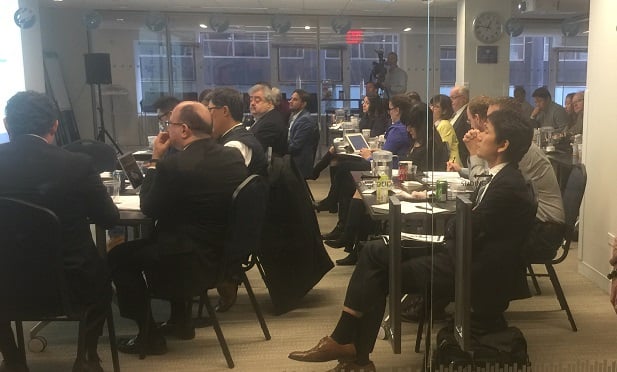 Reporters sought economic wisdom today, in New York, at a Conference Board economic outlook briefing. (Photo: Allison Bell/TA)
Reporters sought economic wisdom today, in New York, at a Conference Board economic outlook briefing. (Photo: Allison Bell/TA)
Financial professionals who sell employee benefits may soon get a strange new economic boost: U.S. employers' hunger to do something to find and keep good workers.
Economists talked about the threat of labor shortages today in New York, at a crowded Conference Board press briefing on the world economic outlook.
Related: How employers are coping with record-low unemployment
The economists announced, to a room full of reporters from all around the world, that they expect the growth of global domestic product (GDP) to fall slightly in 2019, to 3.1%, from 3.2% this year.
The economists predicted that U.S. GDP growth will increase slightly, to 3.2% next year, from 3.1% this year.
The economists suggested that, for the United States, obstacles could include trade tensions and higher interest rates.
They noted several times that increases in labor costs, caused by factors such as general demographic trends, tougher immigration rules and higher minimum wage requirements, could also slow growth.
Employers around the world are already noticing tighter labor markets, and those labor constraints could become more visible next year, the economists said.
Employers are still having a hard time finding professional workers, and now they're also struggling to find blue-collar workers, the economists added.
For financial professionals, those trends could translate into more demand for traditional group benefits products, as well as interesting new voluntary and worksite benefits ideas.
The Conference Board chief economist for North America, Gad Levanon, used retail as an example of the forces helping to strengthen demand for labor, even in the face of advances in technology.
Traditional brick-and-mortar stores may be shedding workers, but the warehouses and transportation companies that make shopping online possible are adding workers, Levanon said during the press briefing.
Washington
Some political observers in and around the life insurance industry have predicted in recent months that dysfunction in Washington will increase the importance of state-level policymakers.
Ken Goldstein, a Conference Board business cycle indicators analyst, said that he thinks gridlock in Washington will lead to more innovation in state government, especially in states like Illinois, Michigan and Ohio that still need to deal with the loss of manufacturing jobs.
States “know they don't have a partner in Washington,” Goldstein said. “They have to go it alone.”
New ideas will probably bubble up from the state level to the federal level over the next 20 years, Goldstein predicted.
The Conference Board
The Conference Board is a nonprofit business group that was founded in 1916.
The organization is to economic research for the world's business community roughly what LIMRA is to financial services market research for the life insurance community.
The current Conference Board chairman is Roger W. Ferguson Jr., the president of Teachers Insurance and Annuity Association of America (TIAA).
The organization's list of voting members also includes top executives from Aegon N.V. Aflac Inc., WellCare Health Plans Inc., Massachusetts Mutual Life Insurance Company, Willis Towers Watson, Metropolitan Life Insurance Company, Guardian Life Insurance Company of America, State Farm, and the Blue Cross and Blue Shield Association, as well as top executives from dozens of companies and organizations from outside the insurance sector.
Read more:
© 2025 ALM Global, LLC, All Rights Reserved. Request academic re-use from www.copyright.com. All other uses, submit a request to [email protected]. For more information visit Asset & Logo Licensing.







